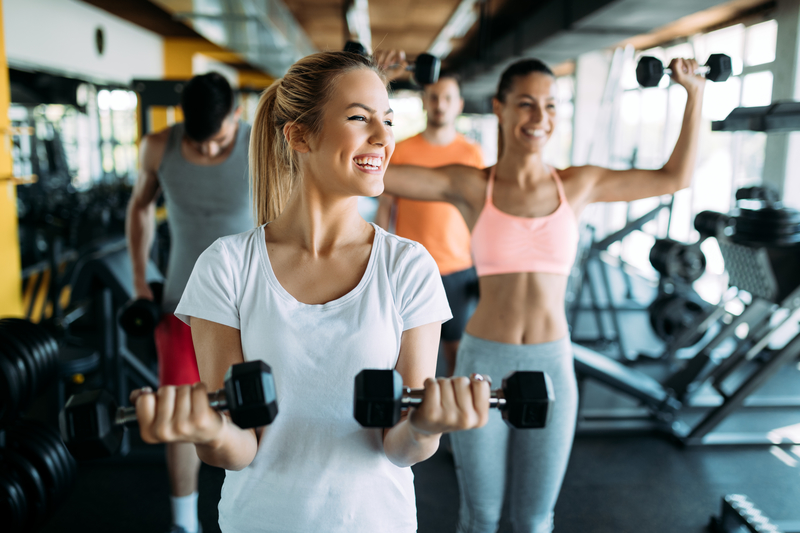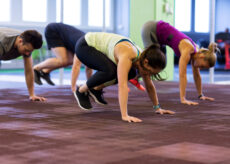40+ Amazing Things That Happen When You Start Working Out

Everyone knows they “should” exercise. We’ve been told over and over again that it’s important to be fit to be healthy. And you’ve likely even heard the “prescription” for how often you should exercise: muscle strengthening exercises at least 2 times per week combined with cardio exercise for a total of 150 minutes a week (or just 75 minutes if you increase the intensity). That’s just 15 to 30 minutes per day if you exercise 5 days each week.
Sadly, a mere 23.5% of Americans (18.7% of women and 27.2% of men) are getting enough exercise according to a report from the CDC’s National Center for Health Statistics. 1 But on a positive note, that number has been on the rise with an increasing number of folks becoming more physically active in recent years.
Is exercise really that important? What actually happens to your body once you start working out? How does it really impact you and your health? Is it worth your time? Are there any immediate benefits?
Let’s take a fun look at the effects of exercise and the 40+ things that happen when you start working out—whether you’re a “newbie” or rebooting your fitness lifestyle. (Spoiler alert: yes, some you even start to enjoy from day 1, and it definitely is worth the effort!)
40 Amazing Things That Happen When You Start Working Out
Day 1:
- Increased Brain Function. From your very first workout, you’ll begin to increase blood flow to the brain, encouraging the brain cells to function better. 2 Both during and after exercise, you may feel more awake and better able to focus.
In addition, during exercise, epinephrine (also called “adrenaline”) is released from the brain, and this chemical is known for both blocking pain and helping make you smarter. As you continue to exercise regularly, this may stimulate the growth of new brain cells, which could help boost memory and learning. 3, 4, 5
- Better Mood. That increased energy and clarity, combined with a rush of endorphins, can also help boost your mood—even on day one. And regular exercise helps folks better deal with daily stress, depression, and anxiety. 6 It does this at least in part by increasing and balancing important neurotransmitters like serotonin, dopamine, glutamate, and GABA, which are well known for helping with mood control. 7
Exercise also promotes the releases of BDNF (brain-derived neurotropic factor), a compound that’s been referred to as “miracle grow for the brain” because it helps protect and repair memory neurons and helps the brain reset, which can lead to feelings of ease and clarity. However, it’s worth noting that this effect is greater for some people than for others due to genetic differences.
- Better Blood Sugar Management. Especially if you are training with weights, you will begin to improve your muscles’ ability to take up and burn glucose (blood sugar). It also helps optimize insulin and leptin sensitivity. 8
- Boost Creativity. What better way to put that mood boost to work than to use your brain creatively? Exercise has been shown to boost creativity for up to 2 hours after your workout. 9 So, if you’re looking for a solution, trying to get into the creative flow, or just need a new idea, hit the gym, pound the pavement, or do some bodyweight movements to refresh your body and mind and get those creative juices flowing.
- Get Rid of Cravings. While some people claim they work up an appetite after exercise, research suggests the opposite—exercise tends to blunt appetite. Even a single 45-minute workout in the morning may actually reduce food cravings as well as how we respond to food cues. 10
- Muscle Soreness. If you haven’t been physically active for a while or you’re trying a new workout, you may feel some muscle soreness, especially the day or two after your workout. Start slowly and gently, working up to longer and/or more intense workouts to mitigate muscle soreness and discomfort. And soon, you’ll be able to push yourself harder without feeling as sore (and will likely even start enjoying the feeling of being a bit sore from a great workout). In fact, by just the second or third time you’ve performed a workout, your body starts to adapt, so you feel less sore. 11
Week 1:
- More Energy. After your first week or so of exercise, instead of feeling zapped of energy after a workout, you’ll start to actually feel more energized throughout the day. 12
This is likely because you begin to improve both the number and function of mitochondria as well as capillary density within your muscles—which allows your body to produce more ATP energy and improve oxygen delivery. That added energy will continue to build throughout the next few weeks and months so you’ll be able to accomplish even more. 13
Month 1+:
- Increased Muscle Strength. After just 2 to 4 weeks, as long as you are lifting weights and consuming enough protein, you’ll start to notice improved strength and fitness as your neuromuscular system is becoming more efficient, 14 so you are better at contracting your muscles.
- Increased Metabolic Rate. This increase in activity and the recovery requirements (sometimes called the “afterburn”) combined with the beginnings of changes in muscle size lead to an increase in metabolic rate, so you start burning more calories even when you’re sitting at your desk, couch surfing, or sleeping. This increase is essential for losing weight and keeping it off. 15, 16
- Fat Cells Shrink. As you continue to exercise, your body gets better at burning fat. As your cardiovascular system improves, your body becomes more efficient at delivering oxygen to your working muscles, which means it’s also more efficient at metabolizing fat for energy. As a result, those fat cells can begin to shrink. 17
- Day-to-Day Benefits. You may start noticing that day-to-day activities become easier. It’s easier to go up a few flights of stairs, get in and out of the car, or get the groceries into the house. You’re less fatigued and feeling better in general.
- Improved Fitness. After training for 6 to 8 weeks, regular exercisers can experience an increase in the mitochondria (the powerhouses of your cells) by up to 50%. 18 This means you’ll feel more fit, you’ll enjoy improved endurance, and your workouts will feel easier.
- The Best Sleep of Your Life. Want to sleep better? Of course! There is strong evidence showing that if you want to sleep better at night, you need to exercise during the day. 19, 20 And if you want to get the most out of your workouts, this sleep is important to support your body’s ability to recover and repair. Just remember to wait at least a few hours between your workout and your bedtime. Otherwise, it may be more difficult to fall asleep.
- Healthier Eating. If you want to improve your eating habits, you may want to start with your workouts. In a recent study from the University of Texas at Austin, researchers looked at 2,680 young people who were neither exercising regularly nor dieting. Once the participants started exercising, they were more likely to choose healthier foods like lean meats, fruits, and vegetables. And their preference for fried foods, sodas, and other unhealthy options decreased. What’s really significant about this research is the participants weren’t instructed to change their eating in any way. It just happened. 21
Month 3:
- Mental Health Stabilizes. Especially if you have suffered from anxiety or depression, you may notice that your mental health has begun to stabilize. Exercise has also been shown to help improve self-esteem—you feel better in your body, and it fosters positive self-worth. 22 And that’s regardless of your size, gender, age, or weight.
Taking it outside can provide an even bigger boost. Whether you want to just take a walk, hike, bike, or jog through the park or nearby nature trail, make a splash at a local river or lake to canoe, kayak, or paddle board, or try something a bit more challenging like rock climbing, some outdoor recreation will feed your spirit, support your emotional wellness, and fuel your body!
- Improved Wound Healing. As we get older, we can have a more difficult time healing from wounds like nicks and scrapes. One small study found that within just 3 months of starting an exercise program, wounds healed much more rapidly. 23
Month 6:
- Increased Strength and Muscle Mass. If you have been strength training at least twice a week, your muscles aren’t just stronger, your body shape is starting to change. Enjoy the compliments as people around you start to notice your increased muscle tone and leaner shape. Oh, and you’ll also enjoy greater endurance.
- Improved Heart Health. Regular exercise improves both the size and strength of your heart muscle as well, so it becomes more efficient. It’s easier to pump blood, so your resting heart rate decreases. This can help reduce the risk of heart attack and help you recover faster if you do have a heart issue. 24
And it doesn’t take a lot of time or effort. In fact, a recent study from Sweden found that replacing a sedentary activity with low-impact physical activity (like standing, walking, and household chores) may reduce the mortality rate from cardiovascular disease by up to 24%. And increasing that activity to moderate levels (like a brisk walk) can have an even greater effect. Ten minutes a day of moderate to intense activity can decrease the risk of death by 38%. And if you hit those golden 30 minutes a day prescribed above, the risk drops by 77%! 25
Year 1:
- Increased VO2max. If you’ve been getting in your cardio, you will have seen about a 25% in VO2max. 26 What does that mean? VO2max is a measure of aerobic capacity that refers to how well your body transports oxygen to your muscles for fuel, and it is arguably one of the strongest predictors of health. In other words, you can run faster for longer. Your effort is paying off!
- Improved Bone Health. After six months, weight-bearing exercises can benefit bone health. And after a year, bones are noticeably denser, which can decrease your risk of osteoporosis and even begin to reverse the effects of the disease. That means you’re less likely to break a bone if you fall.
- Fitness Habits Are Ingrained. Most people who drop out of their exercise routine do so within the first 6 months. If you’ve stuck with it this far, you’re much more likely to continue for the long haul. The habit is now ingrained, and fitness is an important part of your lifestyle. You miss it, or even feel awful, when you skip a workout, which means you keep going back for all of the benefits you’ve built up over the last year.
Lifelong
- Increased Life and Health Span. The changes to the mitochondria mentioned above don’t just increase energy production. They can trigger mitochondrial biogenesis (that is, how new mitochondria are formed in your cells), which could help drastically slow the aging process. 27 In fact, regular exercise has been shown to increase both life and health span by up to 5 to 10 years. 28
Other research has shown that in folks over 70, physical fitness is one of the best predictors of survival. According to Seamus P. Whelton, MD, MPH, assistant professor of medicine at Johns Hopkins School of Medicine, “…regardless of whether you are otherwise healthy or have cardiovascular risk factors, being more fit means you’re more likely to live longer than someone who is less fit.” 29
- Stave off Brain Disease. Many of us are afraid we’ll begin to lose our mental capacity as we get older. Regular exercise is considered the best way to delay or even prevent dementia, such as Alzheimer’s disease, and other neurological issues. 30
- Healthier Eyes and Ears. People who are more physically active have a 42% lower risk of developing cataracts. 31 There’s a similar benefit when it comes to age-related macular degeneration, which is the leading cause of vision loss. 32
Your ears may also benefit. Walking at least 2 hours per week has been associated with a lower risk of hearing loss. 33
- Beef Up Your Bank Account. Want to save $2,500 or more a year? That’s what the estimated savings (on medical costs) is for older folks who exercise just 5 days a week for 30 minutes a day—and that’s just for heart-related problems. But it doesn’t stop there. Those who exercise are less likely to develop arthritis, type 2 diabetes, and even certain types of cancer. This may be because of the effects of exercise on the expression of certain genes. 34
On the other side of the coin, exercise can boost both happiness and self-esteem, and according to Michael Como in research in The Park Place Economist, there is a correlation between wealth and happiness. 35
There are a number of other unexpected benefits of regular exercise. For example, it’s been shown to improve sex drive and satisfaction, boost productivity, ease pain and increase pain tolerance, reduce the risk of getting colds, improve digestion and prevent constipation, keep the skin clear and smooth, and reduce rates of gum disease.
Exercise has also been shown to help as an adjunct to alcohol addiction treatment, increasing the percentage days of abstinence as well decreasing the number of drinks per day. It’s also been shown to decrease cravings for cigarettes.
It doesn’t take a huge investment in time (just 15 to 30 minutes per day), and the effects continue to build.
Even if you had an illness that left you sidelined from your training program… or if you’ve just gotten out of shape because life got in the way, you can start where you are and build up. As Claude Bouchard, director of the human genomics laboratory at Pennington Biomedical Research Center in Louisiana says, “There is no pill that comes close to what exercise can do, and if there was one, it would be extremely expensive.”
If you haven’t already exercised today, why not start right now to begin to reap the amazing number of benefits? Starting on day one!





 7 Signs Your Body is Seriously Low on Collagen (not just wrinkles)
7 Signs Your Body is Seriously Low on Collagen (not just wrinkles) Health Expert: "Turmeric Doesn't Work (unless...)"
Health Expert: "Turmeric Doesn't Work (unless...)" 3 Warning Signs Your Probiotic Supplement is a Total Waste
3 Warning Signs Your Probiotic Supplement is a Total Waste

